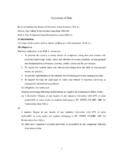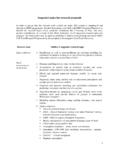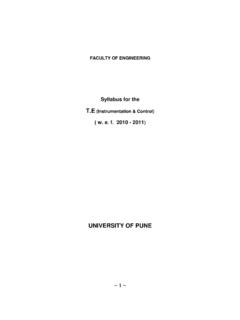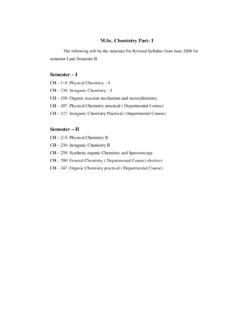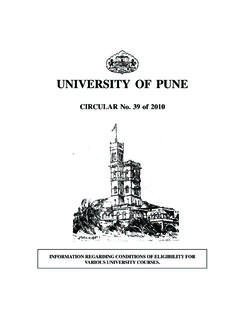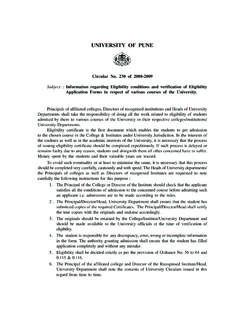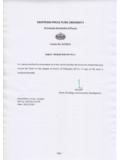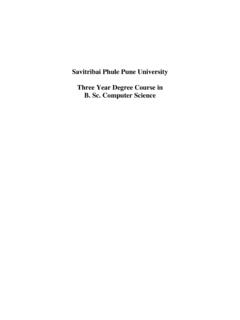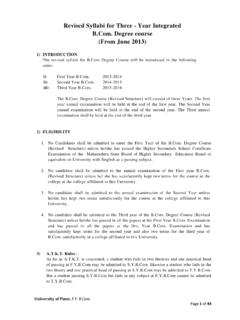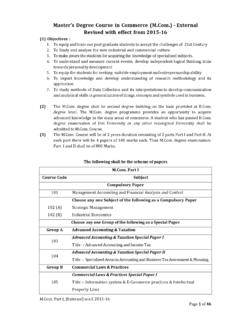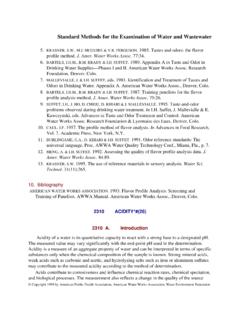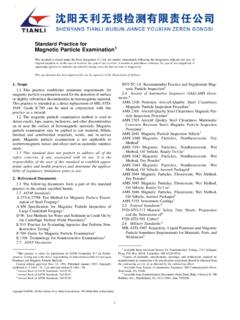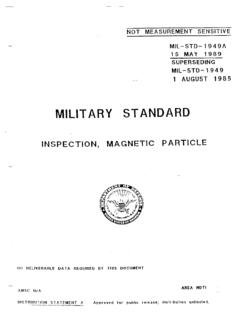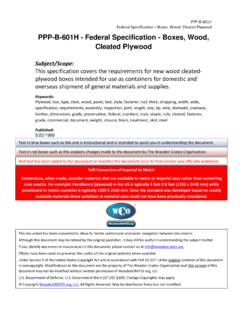Transcription of M. Com (Part I & II) - Official Website.
1 / 1 FACULTY OF COMMERCER evised Syllabus for theM. Com ( part I & II)M. Com part I ( June 2002) part II ( June 2003)UNIVERSITY OF / 2 Publisher s NoteThe University of Pune has great pleasure in publishingthe Revised Syllabus for the (Parts I & II) underthe Faculty of is hoped that this syllabus will be most useful to thestudents of this behalf of the University, I have to thank experts andauthorities of the University for their keen interest and whole-heartely co-operation in bringing out this of Pune Dr. D. D. DeshmukhGaneshkhind, RegistrarPune-411 / 3 UNIVERSITY OF PUNEM aster s Degree Course in Commerce (M. Com.)(Revised with effect from June 2002)(1) Objecties :(1) To equip and train our post graduate students to ac-cept the challenges of 21st Century(2) To Study and analyse the new industrial and com-mercial culture(3) To make aware the students for acquiring the knowl-edge of specialised subjects.
2 (4) To understand and measure current events, developindependent logical thinking, train towards personal-ity development(5) To equip the students for seeking suitable employ-ment and entrepren, purship ability(6) To impart knowledge and develop understanding ofresearch methodology and its application(7) To study methods of Data Collection and its inter-pretations to develop communication and analyticalskills in generalization of things, concepts and sym-bols used in business.(2) The degree shall be second degree building onthe base provided at degree level. The programme provides an opportunity to acquireadvanced knowledge in the main areas of commerce. Astudent who has passed degree examination ofthis University or any other recongized University shallbe admitted to Course.
3 (3) The Course will be of 2 years duration con-sisting of 2 parts part I and part II. At each part therewill be 4 papers of 100 marks each. Thus de-gree examination- part I and II shall be of 800 / 4 The following shall be the scheme of papersM. Com. part I of Management and Management Informa-tion System (MIS) (Common for both parts) Com. part II Course Economics or Business Paper-IV (Research Methodology and project work)(common for both parts)A list of special subjects with 4 papers each is given below(Any one subject to selected common for part I &II)1. Advanced Accounting and Taxation :Paper-I:Advaced AccountingPaper-II:Business TaxationPaper-III :Advanced AuditingPaper-IV :Research in Accounting andProject Work2.
4 Advanced Cost Accounting and Cost Systems :Paper I: Advanced cost AccountingPaper II: Cost Control and Cost SystemsPaper III : Cost and Management AuditPaper IV : Research Methodology and Project Work(With reference to Cost Accounting) / 53. Business Practices and Environment :Paper I: Business PracticesPaper II: Business EnvironmentPaper III : Enterpreneurship DevelopmentPaper IV : Research Methodology any Project Work4. Business Administration :Paper I: Production, Operation and MarketingManagementPaper II: Financial ManagementPaper III : Human Resource ManagementPaper IV : Research Methodology and Project Work(With reference to BusinessAdministration5. Secretarial Practice and CompanyManagement :Paper I: Laws and Practices relating to LPGP aper II: Intellectual Property LawsPaper III : World Trade OrganisationPaper IV : Research Methodology and Project Work(With reference to application of above Laws)6.)
5 Co-operation and Rural Development :Paper I: Co-operative Movement in India andAbroadPaper II: Organisation and Management of Co-operative BusinessPaper III : Co-operative Credit and Banking SystemsPaper IV : Research Methodology and Project Work(With reference to Co-operation7. Advanced Banking and FinancePaper I: Law and Practice of BankingPaper II: Central Banking and Monetary / 6 Paper III : Foreign Exchange and InternationalFinancePape IV : Research Methodology and Project Work(With reference to Banking and Finance)4. Scheme of Teaching and Examination(1) There will be 4 periods of 60 minutes each per weekper paper. The college/Department is free to arrangefor teaching of part I or II Course or both Coursessimultaneously.)
6 For each paper of 100 marks there willbe Term End Examination (at the end of First Term) of3 Hours duration/60 marks (to be converted in to out of20) and the Annual Examination of 3 Hours duration/100 marks (to be Converted in to out of 80 marks forregular candidates) at the end of Second Term of theAcademic Year. The question paper for both the ex-aminations will be based on testing the knowledge oftheory, applicability and problems or cases whereverapplicable as detailed in the syllabi. The question pa-per for term end exaination will be set on the syllabiprescribed for the1st Term. The question papers forAnnual Examination will be set on the entire questions in the Annual Examination will be bymarks in the ratio of 40% on the syllabi prescribed forthe First Term and 60% on the syllabus prescribed forthe Second Term.
7 The existing rules and regulations of85 pattern examination shall be made applicable. Theterm end examination will be conducted only once inan Academic Year. The Candidates will be allowed tojoin Second Year of part I/II Course irrespec-tive of the number of backlogs at the First Year Exami-nation. The present rules, ordinances governing TermEnd and Annual Examination shall remain / 7(II)Research Methodology and Project WorkGuidelines for Teaching and Evaluation of ResearchMethodology and Project work : Paper No. 4 of eachspecial subject :(A) Term End examination of Research Methodologywill be conducted by the College by appointing theInternal Panel of Paper-Setters and Examiners asper University norms. It will carry 50 marks andwill be of 2 hours duration.
8 Expenditure on Paper-Setting, evaluation, printing, stationery and otheradministrativee expenses will be done out of thefees collected from the students. Term-End exami-nation marks shall be sent to the University by theend of December every year.(B) Project Viva-Voce will be conducted at theend of the Academic year but before thetheory examination of the part will Carry 50 marks. It will be conductedby the Internal and External examinersappointed by the Principal as per the Universityguidelines. These 50 marks will be given by eachexaminer and the average will be taken as 50 marks shall be broadly divided as :Project Report Writing: 30 MarksProject Viva-Voce: 20 MarksTotal Marks: 50 MarksThe Principal of the College shall pay the remu-neration to the Internal and External Examiners andother Non-Teaching Staff out the fee collected bythe / 8 External Examiner : Rs.
9 25/- Per student per Ex-aminerInternal Examiner : Rs. 25/- Per student per Ex-aminerNon-Teaching Staff : As per the university be paid to the External Examiners asper the University rules.(C) Students are required to prepare the Project Re-port based on the field work and studying the cur-rent trends under the guidelines of his project Project work is also compulsory for externalstudents and they will have to submit the reports tothe nearest College where teaching is the end of the Second year of a studentwill be examined in the Project work as perthe following :(a) Project work should be done individually by thecandidate in consultation with project guide.(b) Student should take guidance from Internal guideand prepare a Project Report on Project workin two copies to be submitted to the concernedteacher till 15th March.
10 (c) A Project Report shall consist about 50 to 60 Pages.(d) The Project Work should be of such a naturethat it could prove useful or be relevant fromthe Business/Management angle. Project obser-vations, suggestions and conclusions shall forman inevitable part of the project Standard of PassingA candidate is required to obtain at least 40 marks / 9of 100 to pass in each paper at the Annual Examination(in case of regular candidates 32 marks out of 80 marksat the Annual Examination).A regular candidate shall be declared to have passed inthe paper provided he/she has secured an agreegateof 40% marks in the Term End and Annual Examina-tion taken together in paper. Passing in Term End ex-amination is not compulsory. A candidate having 32marks out of 80 marks in the Annual Examination andTerm End Examination taken together may improve hisperformance in the paper by appearing only for Award of Class :The class in respect of Examination beawarded to the candidates on the basis of aggregatemarks obtained by them in all the eight papers at thePart I and II together.
